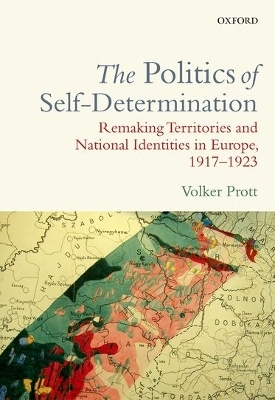
The Politics of Self-Determination
Remaking Territories and National Identities in Europe, 1917-1923
Seiten
2016
Oxford University Press (Verlag)
978-0-19-877784-7 (ISBN)
Oxford University Press (Verlag)
978-0-19-877784-7 (ISBN)
Addresses the pitfalls of border drawing in post-WWI Europe, arguing that at international and local levels, the 'temptation of violence' made national self-determination problematic, as local elites, administrations, and paramilitary leaders used ethnic notions of identity to mobilise popular support under a guise of international legitimacy.
The Politics of Self-Determination examines the territorial restructuring of Europe between 1917 and 1923, when a radically new and highly fragile peace order was established. It opens with an exploration of the peace planning efforts of Great Britain, France, and the United States in the final phase of the First World War. It then provides an in-depth view on the practice of Allied border drawing at the Paris Peace Conference of 1919, focussing on a new factor in foreign policymaking-academic experts employed by the three Allied states to aid in peace planning and border drawing. This examination of the international level is juxtaposed with two case studies of disputed regions where the newly drawn borders caused ethnic violence, albeit with different results: the return of Alsace-Lorraine to France in 1918-19, and the Greek-Turkish War between 1919 and 1922. A final chapter investigates the approach of the League of Nations to territorial revisionism and minority rights, thereby assessing the chances and dangers of the Paris peace order over the course of the 1920s and 1930s.
Volker Prott argues that at both the international and the local levels, the 'temptation of violence' drove key actors to simplify the acclaimed principle of national self-determination and use ethnic definitions of national identity. While the Allies thus hoped to avoid uncomfortable decisions and painstaking efforts to establish an elusive popular will, local elites, administrations, and paramilitary leaders soon used ethnic notions of identity to mobilise popular support under the guise of international legitimacy. Henceforth, national self-determination ceased to be a tool of peace-making and instead became an ideology of violent resistance.
The Politics of Self-Determination examines the territorial restructuring of Europe between 1917 and 1923, when a radically new and highly fragile peace order was established. It opens with an exploration of the peace planning efforts of Great Britain, France, and the United States in the final phase of the First World War. It then provides an in-depth view on the practice of Allied border drawing at the Paris Peace Conference of 1919, focussing on a new factor in foreign policymaking-academic experts employed by the three Allied states to aid in peace planning and border drawing. This examination of the international level is juxtaposed with two case studies of disputed regions where the newly drawn borders caused ethnic violence, albeit with different results: the return of Alsace-Lorraine to France in 1918-19, and the Greek-Turkish War between 1919 and 1922. A final chapter investigates the approach of the League of Nations to territorial revisionism and minority rights, thereby assessing the chances and dangers of the Paris peace order over the course of the 1920s and 1930s.
Volker Prott argues that at both the international and the local levels, the 'temptation of violence' drove key actors to simplify the acclaimed principle of national self-determination and use ethnic definitions of national identity. While the Allies thus hoped to avoid uncomfortable decisions and painstaking efforts to establish an elusive popular will, local elites, administrations, and paramilitary leaders soon used ethnic notions of identity to mobilise popular support under the guise of international legitimacy. Henceforth, national self-determination ceased to be a tool of peace-making and instead became an ideology of violent resistance.
Volker Prott is lecturer in modern European history at the University of Melbourne. His research interests include Franco-German history, the history of the First World War, and the Interwar Period, as well as Cold War history. In particular, his work explores the historical dynamics of nationalism, ethnic violence, expertise, and political decision-making. His research is driven by comparative and transnational approaches and draws on social science theories. He obtained his PhD from the European University Institute in Florence, Italy, and was post-doctoral research and teaching fellow at the University of Tübingen in Germany.
PART I: PLANNING THE POST-WAR ORDER; PART II: IMPLEMENTING THE PARIS SYSTEM
| Erscheinungsdatum | 05.08.2016 |
|---|---|
| Verlagsort | Oxford |
| Sprache | englisch |
| Maße | 164 x 240 mm |
| Gewicht | 550 g |
| Themenwelt | Geschichte ► Allgemeine Geschichte ► Neuzeit (bis 1918) |
| Geschichte ► Allgemeine Geschichte ► 1918 bis 1945 | |
| Geisteswissenschaften ► Geschichte ► Regional- / Ländergeschichte | |
| Geschichte ► Teilgebiete der Geschichte ► Kulturgeschichte | |
| Sozialwissenschaften ► Politik / Verwaltung ► Europäische / Internationale Politik | |
| Sozialwissenschaften ► Politik / Verwaltung ► Politische Systeme | |
| ISBN-10 | 0-19-877784-1 / 0198777841 |
| ISBN-13 | 978-0-19-877784-7 / 9780198777847 |
| Zustand | Neuware |
| Haben Sie eine Frage zum Produkt? |
Mehr entdecken
aus dem Bereich
aus dem Bereich
Europa 1848/49 und der Kampf für eine neue Welt
Buch | Hardcover (2023)
DVA (Verlag)
48,00 €
Giordano Bruno - ein ketzerisches Leben
Buch | Hardcover (2024)
C.H.Beck (Verlag)
29,90 €
Kunst und Gesellschaft an der Schwelle zur globalen Welt
Buch | Hardcover (2024)
Klett-Cotta (Verlag)
42,00 €


